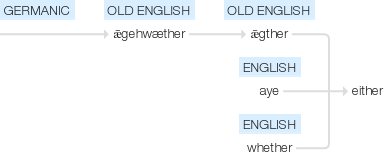Either
Old English ǣgther, contracted form of ǣg(e)hwæther, of Germanic origin; ultimately related to aye1 and whether.
wiktionary
From Middle English either, from Old English ǣġhwæþer, from Proto-Germanic, ultimately corresponding to ay(“always, ever”) + whether. Akin to Old Saxon eogihwethar, iahwethar (Low German jeed); Old Dutch *iogewether, *iowether, *iother (Dutch ieder); Old High German eogihwedar, iegihweder, ieweder (German jeder).
etymonline
either
Old English ægðer, contraction of æghwæðer (pron., adv., conj.) "each of two, both," from a "always" (see aye (adv.)) + ge- collective prefix + hwæðer "which of two, whether" (see whether). Cognate with Old Frisian eider, Dutch ieder, Old High German eogiwedar, German jeder "either, each, every").
Modern sense of "one or the other of two" is late 13c. Adverbially, for emphasis, "in any case, at all," especially when expressing negation, by 1828. Use of either-or to suggest an unavoidable choice between alternatives (1931) in some cases reflects Danish enten-eller, title of an 1843 book by Kierkegaard.
